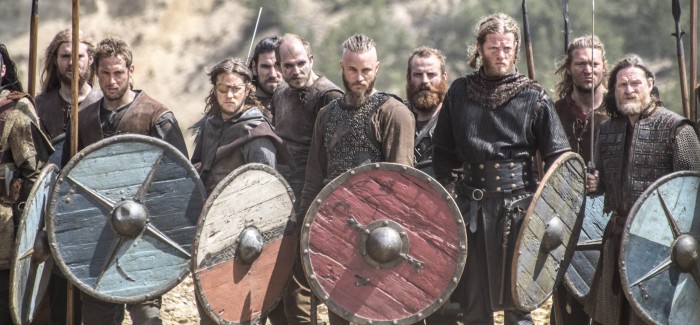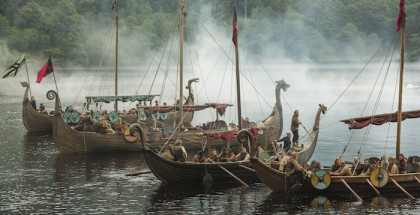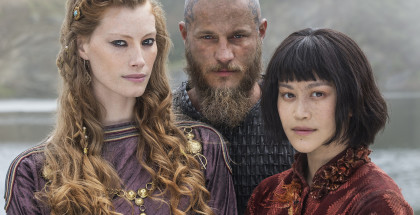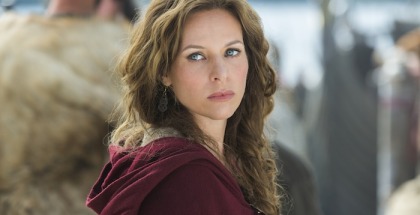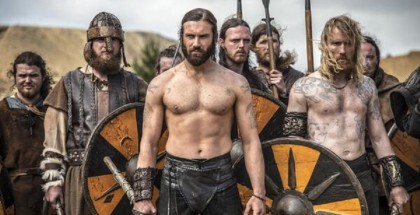Interview: Michael Hirst on Vikings Season 2
David Farnor | On 25, Feb 2014
With Vikings Season 2 sailing back onto Amazon Prime Instant Video (formerly LOVEFILM Instant) on Friday 28th February, we sit down with the series showrunner and creator, Michael Hirst, and chat about Viking myth, historical fact and what’s in store for Ragnar Lothbrok…
So, Season 2 of Vikings. Was that expected?
I certainly hoped that there would be a second season – of course, I left a lot of cliffhangers at the end of Season 1 in a cunning attempt to assure there was a Season 2! I think as we got into the season and it went out in the States and we were watching the figures, it became fairly clear that they would want to do it again. You know, the figures were extraordinary for the first season and we were getting a huge response from what is now a very big fanbase.
And, of course, it was History Channel’s first scripted drama…
For them, it was a step into the unknown. And they trusted us, which was quite extraordinary. So from all our points of view it made sense to carry on. And hopefully on and on…
Has there been talk of Season 3?
There has been – but no official talk.
You mention the big fanbase – were you surprised by just how big it was, both in the US, and here, where it aired on LOVEFiLM Instant?
I was aware while we were doing it that it was a pretty good piece of work and it had been made by a lot of talented people and it looked really wonderful, but I suppose the scale of it was unexpected. There was something rather humbling, actually, to think that millions of people are responding to it and I’m just sitting in my little office – as my children say, “in a field” – near Oxford. Then going on to another season, knowing that you have to do one better…
When did that first hit you?
I realised when we took it to Comic-Con. We had this room full of wild, enthusiastic, but also very intelligent people. The questions were really ineresting. Just from that I ralised we had arrived somewhere. That we had made a mark.
Where there some Viking helmets in the crowd?
(Laughs) There were a few helmets!
The show makes such a point of going against all those stereotypes of what people think of Vikings…
That was actually one of the things that motivated me: to challenge a lot of the stereotypes and cliches about Vikings. It essentially started when I was writing a movie script about Alfeed The Great, who fought against Ragnar’s sons, and I started reading about them and discovering surprise after surprise, how democratic they were, their attitudes towards women, their technological breakthroughs. It dawned on me at that point that I would like to write about them as the lead characters – as the heroes – which is a challenge because they are always “the other”. They are the bad guys. When I was finally commissioned by MGM and History, it was like “Oh my God, I’ve got to actually do that now! I’ve got to find a way to make them attractive, even though I’ve got to show them slaughtering innocent monks…”
It helps that Ragnar’s hair is so different to what you expect from a Viking
We actually cast him very late and when he turned up at the studio, his hair wasn’t long enough to put extensions in! So we had to come up with a look, but we don’t know what the Vikings looked like! It’s fantastic.
And Ragnar’s wife, Lagertha, is dressed very similarly to the men, all these natural materials for their armour…
We know what materials they had and our costume designer went to Scandinavia to do some research so the colours are right… But we made them cooler. (Laughs) Why not?
Of course, most historical accounts of Vikings are written from our perspective. Like you say, they’re “the other”. So this series is like a revision of a revision of the truth…
Yeah. It was interesting during the season, what happens is that the Saxons become “the other” and I was very conscious of that and thought that was kind of cool, but I needed a bridge, Athelstan (a monk played by George Blagden), who to begin with just had a function – to take us into the Viking world, so the audience would be seeing that through Christian eyes and be shocked by certain things. And then, almost without knowing, Athelstan became a human being in whom I was investing time, like Lagertha, who had been a fairly minor character – these people became real and muscled their way into the story in a big way, you know. That’s the difference between writing series TV rather than movies, because you can develop and follow characters, which is why it’s so wonderful.
Athelstan’s fascinating because it’s normally Vikings being converted to Christianity, not the other way around…
Well, his arc in Season 2 is even better because it’s pushing that to extremes. And he does have this very deep spiritual crisis, which is dramatised. It was wonderful to write that. Wonderful.
There’s a promotional still of Athelstan holding a shield. Do we see him fight? Because that’s another big step away from his Saxon life.
Yeah. I was aware that there had been two monks – these are recorded instances, – who had been captured and taken to Scandinavia and had been recaptured in England fighting for the Vikings. One of them was crucified. So I was always aware that if I brought him back, it could have huge consequences for him as a character.
We understand that after the first episode of Season 2, there’s a time-jump, which will see Ragnar’s son grow up…
Yes. We cast Alexander Ludwig from The Hunger Games as the grown-up Bjorn and he’s absolutely wonderful and a great presence. One of the important things about the show is the family relationships, between Ragnar and his wife and his sons. One of the things the historical Ragnar was supposedly concerned about was that his sons would be more famous than him – real fame being so important to the Vikings. So I wanted an older Bjorn, which also gave me an opportunity to deal with what happens to Rollo (Ragnar’s brother, played by Clive Standen). Because there is an end to that and an intervening period. The question is: Can he redeem himself? Does he want to redeem himself? How does he get back into Ragnar’s good books?
That’s what seems to set Vikings apart from other shows – there’s the epic scope, but only a small ensemble of characters
Yes, and hopefully, if people bother to invest in the characters there is some continuity there. It’s true that people get killed off, but not in an arbitrary way and not for effect – for a lot of people, for example, Floki (Gustaf Skarsgård) is a huge character and a lot of people love him.
There’s a trailer in which Floki seems to meet a sticky end…
Yeah! (Laughs) When we showed that at Comic-Con, the whole audience got on its feet and shouted “No! You can’t do that!” It was so funny. It was great. That represents a challenge for me, for Season 3, because I’ve got a lot of well established, well-loved characters, so it’s more difficult to start killing them off! But then their deaths become more important and emotional. That’s just the way I work; small, intimate family units against a huge backdrop, whether it’s the Reformation or the conquest of Essex. You’re engaged in it; it’s not lots of CGI armies running over the place. That may come, but, I mean, Season 1 we had two boats. Season 2 we had nine boats. Season 3… well, Ragnar attacked Paris with 100 boats! So we either use CG or we build 100 boats!
You’ve shied away from CG so far, haven’t you?
Someone showed me some clips from Thor and said: “Look at that, it’s all CGI.” Those guys don’t fight at all. The first battle in Season 2? That fight was choreographed. People were slugging the hell out of each other.
You really feel that too
It gives you that sense of authenticity.
In terms of scale, Season 2 is 10 episodes, is that right?
We did nine in the first season for some arbitrary reason. But you look back now and nine is the magic number of the Vikings! So when we go to Uppsala in Episode 8, it’s nine of everything we kill. History then said “It’s deliberate! We always meant to do nine!” Now, for Season 2 they’re promoting everything with “Nine”, so all their posters have nine characters, there are nine things to find out about each character…
Only increasing by one episode – that seems a deliberate choice not to do, say, 16 episodes or 23.
We were thinking about maybe doing 13 episodes. Because I write them all, I was pretty glad we didn’t do 13!
How much is that your call?
History make those decision finally. They – and all the networks – employ people who just number crunch. They. Know. Everything. They know what all the other shows, what real numbers they have, how they get there… They won’t usually tell me, but I had a car journey with the guy who does that at History and it’s spellbinding! He said “Oh yeah, after the second episode, we knew we had a hit” – not just because of the on-top figures, but he had other figures. You could watch it on your computer and they know how many people are doing that. They’re not supposed to know, but they do.
Because it’s broadcast on History in the US, it has that traditional one-hour runtime, but with people watching online and TV series now becoming web originals too, there’s potential in the future to vary those runtimes. You could have episodes of 20 minutes. Or two hours. Does that potential excite you as a writer?
Because of streaming now, all these different platforms and different ways of watching things now, my daughters – who are now in their late teens and early 20s – watch things differently to the way I do. They’re not impressed by the BBC any more. It’s a very old-fashioned product, essentially. My first lesson was writing for TV – before Tudors, I hadn’t done that before. So the challenge was writing 10 episodes and having arcs for all the major characters. And I found I loved doing that and was good at that. Working with History was totally different because there are five commercial breaks – and you have to have a cliffhanger for every one! I was like “Ok, this is lesson number two”. So then if it’s “Can you write things at different lengths”? That’s easy! (Laughs)
Do you stream much yourself?
No, I don’t. I don’t watch much TV, I don’t go to the cinema very much! I’m very boring. I write most of the time. If I watch things, I watch sport. I suppose it’s important to say I don’t watch things – certainly other shows that are on at the moment, like Game of Thrones – because I don’t want to be influenced in the slightest bit. I don’t happen to like fantasy anyway, but the writer of that show or the books pillaged historical things, you know, so it would be easy to say there was a crossover, so I haven’t watched any of that. But I do reference certain old movies I like! There’ll usually be a Tarkovsky reference in there, or The Third Man…
So if halfway through Season 2 of Vikings, Ragnar ends up in a sewer chase…
Yes! (Laughs)
You mention pillaging historical thing, which is something you seem to love – you keep going back to history for your projects. Why is that?
I do! It’s partly a personality thing, because I have an academic background. I spent a long time at university and so the actual research and the slow development of storylines is something I really enjoy – I need it, personally. I couldn’t write originally. And the way these story arcs or unexpected characters come out is thrilling and I wouldn’t want to miss that.
The other thing, which is very pretentious, but I think it’s true, is that the more we examine and write about our history, the more we understand about ourselves. In the end, fantasy is meaningless but historically-based things, it doesn’t matter how true they are, they drive people to actually read history books to get interested in them, which I know happened in Tudors, and I’m sure will happen with VIkings.
For me, I was born near York – a Viking town. We make the show outside Dublin, which is a Viking town. We are shooting on beaches where we know almost without doubt that VIkings have landed. The centre of England used to be called the Danelaw. Some of our attitudes and some of our legal systems are formed from that. And so we understand a bit more about ourselves.
We put up barriers, because the Christmas monks tried to present them as savages, as people with whom we have nothing in common, but of course we have things in common! In fact, we’ve inherited a lot from them. And besides which, I think their gods are wonderful! I think it’s worth people finding out about their gods. And they’re much older than the Christ God.
I don’t write for educative reasons, but the spillover is there and it’s very rewarding to me.
Vikings Season 2 will be available to stream exclusively on Amazon Prime Instant Video from Friday 28th February. Watch this space for our review of Episode 1.


